Meditation
Why ABC News Anchor Dan Harris Is 10% Happier
After cocaine and a panic attack on live TV, how meditation changed his life.
Posted November 7, 2020 Reviewed by Ekua Hagan

After a bout with cocaine and a panic attack on live TV, ABC news anchor Dan Harris had to make some changes. And he did. I sat down with Harris, and he recounted the trajectory that altered his life for the better. From trouble-minded, fidgety skeptic, to serious-minded meditator and New York Times bestselling author of 10% Happier, to business-minded entrepreneur of the Ten Percent Happier app, Harris transformed his life and has inspired others to make positive changes in their own lives.
Bryan Robinson: Dan, what got you into meditation?
Dan Harris: I had a panic attack on live television in 2004 on Good Morning America. I’d spent a lot of time in war zones after 9/11—a very vicious young reporter. After several years I got depressed, didn’t know I was depressed, and started medicating myself with recreational drugs including cocaine. I went to a shrink, after the panic attack who asked me if I did drugs, and I told him the truth. He pointed out that even though my drug habit wasn’t spectacular—I wasn’t high on the air, wasn’t using every day and it was intermittent and short-lived—it was enough to raise the level of adrenaline in my brain and make it more likely for me to freak out. So that panic attack ultimately landed me into meditation many years later. At first, I was skeptical—very, very, very skeptical.
Robinson: Sometimes skepticism can be a good thing so we’re not gullible.
Harris: I was sold by the science. My parents are scientists and my wife is a scientist. I’m not smart enough to be a scientist, but ultimately, after meditating for not that long, the science was totally irrelevant. I’m glad the science is being done. We’re learning about the functioning of the mind. But for me as an individual in my own practice, it doesn’t matter what the brain scans say. I know what’s happening moment to moment in my own experiences. That’s been hugely helpful.
Robinson: So how did you start?
Harris: In 2009, I was reading a book, Wherever You Go There You Are, that had very practical meditation instructions. My wife and I were on vacation, and I sneaked off into the bedroom, sat on the floor, and let it rip. It was humiliating and very hard, but it was also clear that this was a mental exercise, not hippie nonsense. Seeing how crazy you are, seeing the cacophony is the point because the better your visibility, the less likely you are to be owned by the malevolent upper tier of your ego.
Robinson: So, meditation helped you make a shift from your ego. How is your life different now?
Harris: I came up with this somewhat facetious title, 10% Happier, for my book. I would say that the 10% compounds annually with the skill of mindfulness, concentration, having some warmth and loving-kindness toward yourself and others—that you can get better and better at. So I remain deeply imperfect and retain the capacity to be a schmuck in many ways. But as the internal weather gets balmier, that creates a virtual cycle where you’re feeling less crazed, your relationships with other people inexorably improve as a consequence and upwards you go. That doesn’t mean it’s going to be a hockey stick uninterrupted upward progress. It’s more like an EKG that’s gradually getting better. I’ve had plenty of dips in there, but they’re not as deep as they used to be.
Robinson: There are a lot of skeptics out there. If someone is reading this and they’re skeptical as you were, what would you say to them?
Harris: One is taking a cursory glance at the science, which strongly suggests that small doses of daily meditation can lower your blood pressure, boost your immune system and literally rewire key parts of the brain that have to do with self-awareness, focus, stress, and compassion. It’s very compelling.
The other thing I’d say is it doesn’t require a massive time commitment. I agree with your five-minute chillers. I tell people, one minute counts. I’d rather see people do 5 to 10 minutes a day, but I’m quite familiar with the diabolical difficulty of habit formation. So I like to use two little slogans: “one minute counts” and “daily-ish.” If you can set a loose goal and have a sense of experimentation and humor about your own failings as you establish a habit, I think it’s possible.
The most important thing I learned along the way that made me completely upend my life is that happiness—which we often think of as something that happens to us or the result of luck—is a skill. The very root of the word, “hap” is the same root as “haphazard” or “hapless” which indicates our cultural attitudes about luck. But science is showing us that happiness isn’t luck; it’s actually a skill you can take responsibility for. You can work on mental qualities like focus, mindfulness, the ability to be awake in the present moment, warmth, gratitude—all the mental states we all want are skills, not factory settings that are unalterable. That’s really good news in the era of a tsunami of bad news.
Robinson: So how often do you meditate? What’s your regimen?
Harris: My practice has gone through a whole evolution. I started with 5 minutes a day 11 years ago and did that for about a year. And then I went on my first meditation retreat and upped my daily practice to about 30 minutes a day. And then about 6 years ago shortly after my first book came out, I got it in my head that I was now going to be a serious meditator, and I upped it all the way to 2 hours a day.
It’s less impressive than it sounds. My rule was that I could do as many sessions of whatever length I wanted. So I would find that an Uber ride downtown would take 30 minutes, a big chunk before I went to bed, or little chunks in my office all day long would add up to 2 hours. Over time, I started to realize that it was taking my attention away from other important things like the people in my life.
So about two years ago, I cut down to one hour a day, which all of a sudden was very easy. Even within that one hour, I became much less compulsive about tracking it and making sure I got to an hour. I have so much intrinsic motivation now I’m passed the point of extrinsic motivation to build the habit formation. I know what it’s like when I’m not meditating. My inner weather gets more tempestuous. And over time, meditation has become much more relaxed and enjoyable.
Robinson: Can we go back to your internal weather? You know that little voice in your head that we all have. How does mindfulness serve you in that moment?
Harris: As you develop mindfulness, you see anger or fear arise, and there’s a buffer or space there. You don’t necessarily have to take the bait and act on it. So I’m talking to my wife, and I notice I have the urge to say something that will ruin the next 48 hours of my marriage. Sometimes I don’t say the thing, and it hurts. I feel the pain in my chest, the buzzing in my ears or I get a headache. There’s a meditation cliché I like which is, “Hurts more, suffer less.” It hurts when you’re self-aware and see what anger does to your body. It’s quite toxic, but you’re creating less suffering for yourself and others by not acting on it.
Over the last couple years, I’ve noticed my attitude toward the lizard brain is warmer. Just as you say, it’s not bad. It’s trying to serve you, to protect you, however, unskillfully often. Instead of meeting the aggression with more aggression, I blow it a kiss and say, “I get it. I salute you. Welcome to the party.” There is this idea in Western culture that we’re going to slay our dragons, but I think it’s hugging the dragon that is the key.
And then there’s one other thing I’ve found to be helpful that I would add: to see it less personally—to see it as nature. Even the most embarrassing thinking or urges you’re feeling—that feel like you—can be viewed as just nature. Obviously, you are part of nature. So anything you think or do—no matter how crazy, random or ugly it is—is just nature. So just viewing it as nature depersonalizes it and helps you step out of it without dissociation, and you’re not so caught up in the story of you. My inner planner has a name and the anger has a name. When they come up in meditation, I say, “Welcome to the party, Robert.”
Robinson: Tell me what the title 10% Happier means for people who may not have read the book.
Harris: It started kind of as a joke when I was talking to a colleague who was making fun of me for meditating because it wasn’t cool yet. She said, “Why are you putting yourself through this?” And I said, pulling it out of the air, “Eh, because it makes me 10% happier.” And I noticed the look on her face changed from scorn to vague interest. So I thought, alright, here’s my shtick.
I liked it because it’s true enough, and it’s a counter-program against the reckless, craven peddling of hope in the self-help industry where books promise you can solve all your problems through the power of positive thinking. It struck me as catchy with a little bit of Buddha-esque smirk around the corner of the lips turned into a smile. It had some attitude baked into it, and it seemed like a realistic promise. It’s somewhat of a joke but close enough.
I’m not a meditation fundamentalist who argues that this is somewhat of a silver bullet. There are no silver bullets. My proposition is only that meditation should be in the pantheon of no-brainers along with sleep, exercise, nutrition, positive relationships, meaningful work, and access to nature.
Dan Harris will appear at Resiliency 2021 on Sept. 9, 2021.




